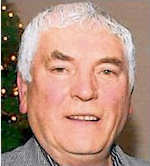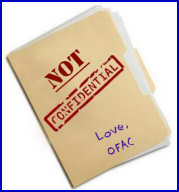 ABOVE: Thomas McGuinn
ABOVE: Thomas McGuinn
An excellent article by Justin Blum on the U.S. investigation of the Irish company Mac Aviation appeared today on Bloomberg News. I have previously reported here and here on the pending indictments of Mac Aviation and its principals Tom and Sean McGuinn arising out of their efforts to acquire aircraft parts and other items from U.S. suppliers for export to Iran. Blum has done considerable research and leg-work in reporting this story, including a number of interviews with law enforcement sources working on the case and speaking on condition of anonymity. It’s well worth a read. (I would recommend the article even if I were not quoted in it.)
The story clears up one detail I wondered about with respect to F-5 canopy panel exports contained in the superseding indictment of Mac Aviation and its principals Tom and Sean McGuinn. Commerce Overseas, the California company that ultimately sold the F-5 panels to Mac Aviation refused to sell the panels to Mac Aviation in Ireland or to deliver them to its representatives in the United States without an export license. Ultimately, however, Commerce Overseas released the panels to ABL Freight. The superseding indictment does not indicate the reason for Commerce Overseas’ change of heart.
Blum’s reporting indicates that Commerce Overseas decided to release the canopies to ABL Freight after an ABL manager, Eddie Garcia, agreed in writing not to export these items without an export license. Of course, the first thing that happened once ABL received the panels is that Garcia changed the shipping invoices, relabeled the contents as plastic panels, and indicated a shipping destination of Malaysia.
Garcia said he didn’t know the package contained F-5 parts and just included the documents Mac Aviation provided.
“We’re just simple people trying to do the business and that’s it,†he said.
Uh huh. Right. Garcia had to have known that there were export controlled items in the package, even if he didn’t know they were F-5 parts. Otherwise, why would Commerce Overseas have extracted from him the pledge not to export without a license? So he should have thought twice before swapping the labels and exporting the package. There was not, last time I checked, an exemption in the Arms Export Control Act for “simple people trying to do business.”
Blum’s story also delves into another anomaly in the Mac Aviation matter. Tom McGuinn pleaded guilty to export charges in 1994. Although that resulted in McGuinn winding up on the State Department’s List of Statutorily Debarred Parties, he was not placed on the Denied Persons List maintained by the Commerce Department, even though the conviction would permit him to have been placed on that list by Commerce. Companies and individuals on that list cannot receive any exports from the United States. According to Blum:
The Commerce Department, which regulates dual-use items, was never informed that McGuinn entered a guilty plea, so it put neither Mac Aviation nor McGuinn on its roll of those banned from exports of any items originating from the U.S., according to Kevin Griffis, a spokesman for the department.
The department now receives regular accounts of convictions, he said.
The five-year statute of limitations on export penalties would prevent Commerce from adding McGuinn to this list at this late date.
UPDATE: The five-year statute of limitations contained in 28 U.S.C. § 2462 applies to the judicial enforcement of any administrative penalty, which would include denial orders. It’s not entirely clear whether or not this would limit the period of time in which a denial order could be issued after conviction of an export law violation. If it doesn’t impose such a limit, then the question arises as to why the Department of Commerce, now that it is aware of the conviction of Thomas McGuinn (and has been for some time), hasn’t imposed a denial order on Mr. McGuinn and his company.
 Earlier this month, a federal district court judge in New York ruled that the Office of Foreign Assets Control (“OFAC”) was required to disclose to the New York Times the names of all individuals who had been granted licenses relating to activities in foreign countries, such as Iran, where such activities would otherwise be illegal. OFAC had previously agreed to disclose the names of corporate licensees to the New York Times after it filed its lawsuit seeking names of all companies and individuals with OFAC licenses. (The New York Times lawsuit likely explains OFAC’s decision earlier this year to advise corporate licensees that it would release their identities to the public notwithstanding Exemption 4 of the FOIA which exempts confidential business information from release under the act.)
Earlier this month, a federal district court judge in New York ruled that the Office of Foreign Assets Control (“OFAC”) was required to disclose to the New York Times the names of all individuals who had been granted licenses relating to activities in foreign countries, such as Iran, where such activities would otherwise be illegal. OFAC had previously agreed to disclose the names of corporate licensees to the New York Times after it filed its lawsuit seeking names of all companies and individuals with OFAC licenses. (The New York Times lawsuit likely explains OFAC’s decision earlier this year to advise corporate licensees that it would release their identities to the public notwithstanding Exemption 4 of the FOIA which exempts confidential business information from release under the act.)
 Posted by
Posted by  Category:
Category: 

 The recently-passed
The recently-passed 

 Earlier this month the Bureau of Industry and Security (“BIS”) imposed a
Earlier this month the Bureau of Industry and Security (“BIS”) imposed a 

